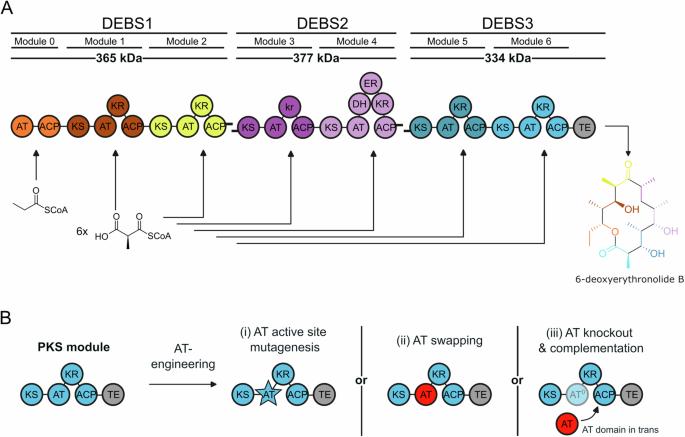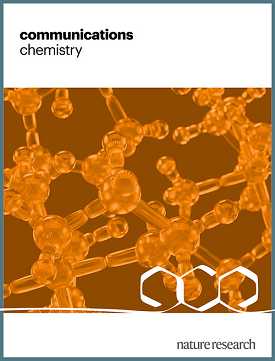小鼠脂肪酸合成酶中的丙二酰/乙酰转移酶是一种编辑多酮支架的杂交工程工具。
IF 5.9
2区 化学
Q1 CHEMISTRY, MULTIDISCIPLINARY
引用次数: 0
摘要
模块化多酮合成酶(PKSs)在具有医药相关特性的复杂天然产物的生物合成过程中发挥着至关重要的作用。它们的模块化结构使其成为生产平台化学品和药物的有吸引力的工程目标。在本研究中,我们证明小鼠脂肪酸合成酶中的杂合丙二酰/乙酰转移酶结构域(MAT)是生产多酮类似物的多功能工具。我们利用三个模块化 PKS 评估了 MAT 结构域的相关性;短的三模块化文尼霉素合成酶(VEMS),以及负责生产抗生素前体红霉素和匹红霉素的 PKS 模块脱氧红霉素内酯 B 合成酶(DEBS)和匹红霉素合成酶(PIKS)。为了评估 MAT 交换 PKS 的性能,我们分析了蛋白质质量,并在体外进行了工程多酮合成。我们的实验包括氟化大内酯的化学合成。我们的研究展示了基于 MAT 的多酮苷生物合成重编程是对装饰多酮苷支架的取代基进行区域选择性编辑的一种简便选择。本文章由计算机程序翻译,如有差异,请以英文原文为准。

The malonyl/acetyl-transferase from murine fatty acid synthase is a promiscuous engineering tool for editing polyketide scaffolds
Modular polyketide synthases (PKSs) play a vital role in the biosynthesis of complex natural products with pharmaceutically relevant properties. Their modular architecture makes them an attractive target for engineering to produce platform chemicals and drugs. In this study, we demonstrate that the promiscuous malonyl/acetyl-transferase domain (MAT) from murine fatty acid synthase serves as a highly versatile tool for the production of polyketide analogs. We evaluate the relevance of the MAT domain using three modular PKSs; the short trimodular venemycin synthase (VEMS), as well as modules of the PKSs deoxyerythronolide B synthase (DEBS) and pikromycin synthase (PIKS) responsible for the production of the antibiotic precursors erythromycin and pikromycin. To assess the performance of the MAT-swapped PKSs, we analyze the protein quality and run engineered polyketide syntheses in vitro. Our experiments include the chemoenzymatic synthesis of fluorinated macrolactones. Our study showcases MAT-based reprogramming of polyketide biosynthesis as a facile option for the regioselective editing of substituents decorating the polyketide scaffold. Modular polyketide synthases (PKSs) play a vital role in the biosynthesis of complex natural products with pharmaceutically relevant properties, and their modular architecture makes them an attractive target for engineering to produce platform chemicals and drugs. In this study, the authors demonstrate that the promiscuous malonyl/acetyl-transferase domain (MAT) from murine fatty acid synthase serves as a highly versatile tool for the production of polyketide analogs.
求助全文
通过发布文献求助,成功后即可免费获取论文全文。
去求助
来源期刊

Communications Chemistry
Chemistry-General Chemistry
CiteScore
7.70
自引率
1.70%
发文量
146
审稿时长
13 weeks
期刊介绍:
Communications Chemistry is an open access journal from Nature Research publishing high-quality research, reviews and commentary in all areas of the chemical sciences. Research papers published by the journal represent significant advances bringing new chemical insight to a specialized area of research. We also aim to provide a community forum for issues of importance to all chemists, regardless of sub-discipline.
 求助内容:
求助内容: 应助结果提醒方式:
应助结果提醒方式:


